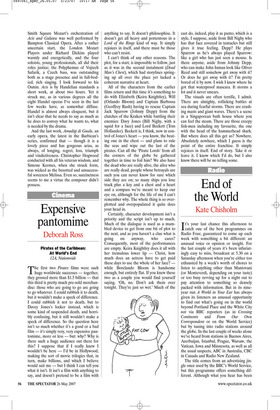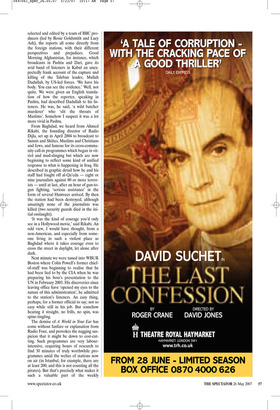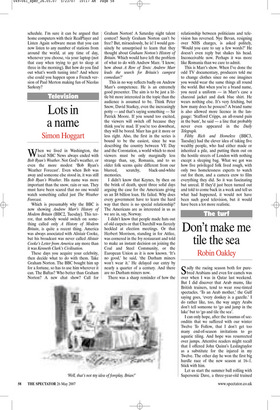End of the World
Kate Chisholm
It’s your last chance this afternoon to catch one of the best programmes on Radio Four, guaranteed to come up each week with something a bit different: an unusual voice or opinion or insight. For the last couple of years it’s been infuriatingly easy to miss, broadcast at 5.30 on a Saturday afternoon when you’re either too exhausted by a week’s worth of chores to listen to anything other than Mantovani (or Monteverdi, depending on your taste) or too busy revving up for a night out to pay attention to something so densely packed with information. But in its nineyear run A World in Your Ear has always given its listeners an unusual opportunity to find out what’s going on in the world beyond Portland Place and the White City not via BBC reporters (as in Crossing Continents and From Our Own Correspondent or on the World Service) but by tuning into radio stations around the globe. In the last couple of weeks alone we’ve heard from stations in Buenos Aires, Azerbaijan, Istanbul, Prague, Warsaw, the Vatican, Iowa and Minnesota, as well as all the usual suspects, ABC in Australia, CBC in Canada and Radio New Zealand.
The title comes from an advertising jingle once used by the BBC’s World Service, but this programme offers something different. Although what you hear has been selected and edited by a team of BBC producers (led by Rosie Goldsmith and Lucy Ash), the reports all come directly from the foreign stations, with their different perspectives and prejudices. Good Morning Afghanistan, for instance, which broadcasts in Pashtu and Dari, gave its avid band of listeners in Kabul an unexpectedly frank account of the capture and killing of the Taleban leader, Mullah Dadullah, by US-led forces. ‘We have his body. You can see the evidence.’ Well, not quite. We were given an English translation of how the reporter, speaking in Pashtu, had described Dadullah to his listeners. He was, he said, ‘a wild butcher murderer’ who ‘slit the throats of Muslims’. Somehow I suspect it was a lot more vivid in Pashtu.
From Baghdad, we heard from Ahmed Rikabi, the founding director of Radio Dijla, set up in April 2004 to broadcast to Sunnis and Shiites, Muslims and Christians and Jews, and famous for its cross-community call-in programmes which began in vitriol and mud-slinging but which are now beginning to reflect some kind of unified response to what is happening in Iraq. He described in graphic detail how he and his staff had fought off al-Qa’eda — eight or nine journalists against 80 or more terrorists — until at last, after an hour of gun-togun fighting, ‘serious assistance’ in the form of several Humvees arrived. By then the station had been destroyed, although amazingly none of the journalists was killed (two security guards died in the initial onslaught).
‘It was the kind of courage you’d only see in a Hollywood movie,’ said Rikabi. An odd view, I would have thought, from a non-American, and especially from someone living in such a violent place as Baghdad where it takes courage even to cross the street in daylight, let alone after dark.
Next minute we were tuned into WBUR Boston where Colin Powell’s former chiefof-staff was beginning to realise that he had been lied to by the CIA when he was preparing his boss’s presentation to the UN in February 2003. His discoveries since leaving office have ‘opened my eyes to the nature of this administration’, he admitted to the station’s listeners. An easy thing, perhaps, for a former official to say; not so easy while still in his job. But somehow hearing it straight, no frills, no spin, was spine-tingling.
The demise of A World in Your Ear has come without fanfare or explanation from Radio Four, and provokes the nagging suspicion that it might be down to cost-cutting. Such programmes are very labourintensive, requiring hours of research to find 30 minutes of truly worthwhile programmes amid the welter of stations now on air (in Istanbul, for example, there are at least 200, and this is not counting all the pirates). But that’s precisely what makes it such a valuable part of the weekly schedule. I’m sure it can be argued that home computers with their RealPlayer and Listen Again software mean that you can now listen to any number of stations from around the world, at any time of day, whenever you choose, via your laptop (not that easy when trying to get to sleep at three in the morning). But how do you find out what’s worth tuning into? And where else could you happen upon a French version of Paul Merton making fun of Nicolas Sarkozy?




















































































 Previous page
Previous page